How FCT Area Council Public Library Is Left To Rot Despite Students Needing One
Kuje Area Council’s public library has not been in use for about a decade after gulping investment of at least N50 million—a huge resource for an area council. In this investigation, HumAngle shows how its neglect by successive governments in the Council deprives the community of a much-needed educational resource.
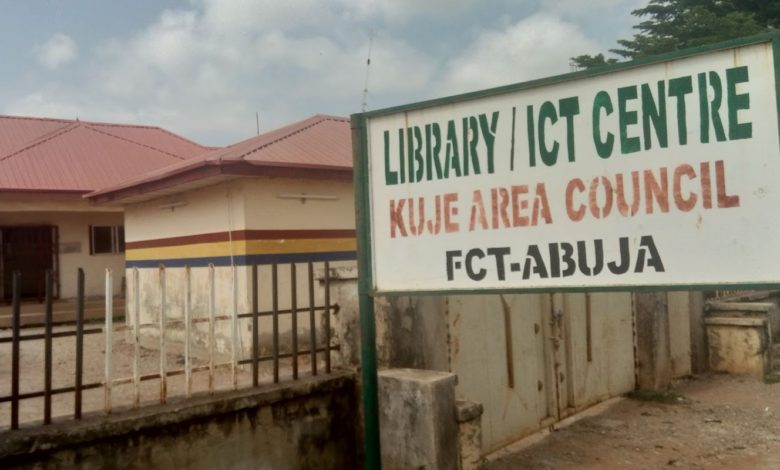
Fourteen-year-old Uchenna Amarachi, a second-year student at Junior Secondary School (JSS) Kayarda, has never used a library though she lives about a kilometre away from one — or what is supposed to be the Kuje public library/ICT centre.
Amarachi lives at Unguwar Gede, a settlement within Kuje Area Council in Nigeria’s Federal Capital Territory (FCT), Abuja. During holidays, she studies at home, using books her mother provides for her. “But I would like access to a wider range of books,” the teenager tells HumAngle. “I would love to read books on Nigeria’s history and those of other countries around the world.”
No wonder, after her secondary school education, Amarachi wants to take the path of arts, even though she is uncertain about what to major in.
Amarachi is also interested in reading storybooks so she can connect and explore the world. As far as she is concerned, a quiet space within her community will go a long way in helping her achieve that.
Coming from a family of six children, her reading and learning process is sometimes affected by house chores and the noise around her. To make matters worse, even her school, which is a kilometre away from the abandoned public library, lacks a library.
The project
Fourteen years ago, Kuje Area Council could not boast of a single public library. But on Sept. 25, 2007, one was commissioned by Sen John James Akpanudoedehe, then Hon Minister of State for the FCT, after it was completed and fenced by the then executive chairman, Hon Danladi Etsu Zhin.
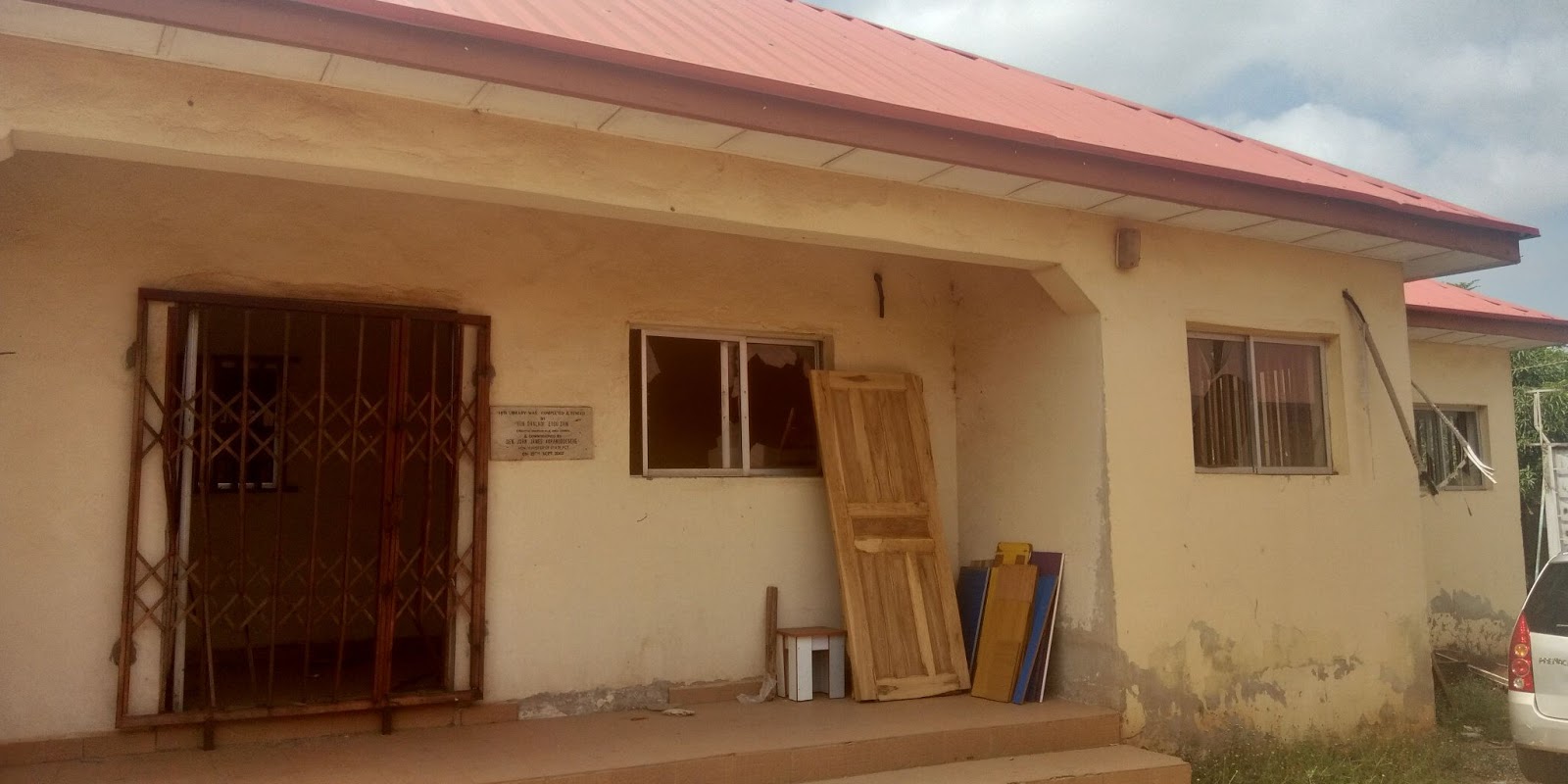
Apparently, the library project was initiated during the tenure of Zhin’s predecessor, Usman Jibrin Wowo, who served as chairman between 1997 and 2005.
So, what Hon Zhin met when he became chairman, was a structure about 70 per cent finished. “I completed the building and furnished the library with about a hundred or more computers,” he says. “The place became functional until I left.”
But contrary to this, a source who works within the premises, where there is an office for Road Safety Corps staff and the fire service, says the library was never functional and simply served as an office.
The same source adds that during the #EndSARS protest, the library was vandalised and valuables worth about N50 million, which included air-conditioning sets, solar panels, and about 40 new computers, were stolen.
In the absence of documents from the Council to get the exact cost of the library initiative, HumAngle’s independent research shows that the price of a modest HP desktop, similar to some of those available as of 2017 in Kuje’s library, fluctuated between N120,000 to N160,000 between 2007 and 2021.
So, if a brand-new computer cost as low as N120,000 in 2007 and a hundred were purchased, the Council spent at least N12 million. This is apart from the cost of furniture such as desks and chairs.
Again, a professional builder who assessed the building put the estimated amount spent at not less than N8.5 million as of the time it was completed in 2007.
The library has two sections where not less than 20 new but dusty desktop computers sat on desks with a chair each and cubicles for readers, according to a 2017 report. There was also “a rest room within the building, offices and a room where batteries for solar panels and other equipment like printers, were kept. In the event power goes out, the library and ICT centre is expected to run on solar energy.”

Libraries and learning; any link?
Experts who spoke to HumAngle posit that in communities, especially rural areas where children do not have a conducive environment for study at home, the library becomes an essential learning tool.
It is also believed that learning promotes the culture of reading, which in turn improves children’s ability to communicate at early ages.
Precious Aigbe, an educationist, pointed out that libraries are an integral part of a child’s life, from primary to secondary school level.
“Apart from the fact that a library within a school environment would help students’ reading culture, it also helps them to see beyond the shores of their local environment,” Aigbe said. “Most people don’t get the opportunity to travel, but with a library in their school, they get to explore beyond their immediate environment.”
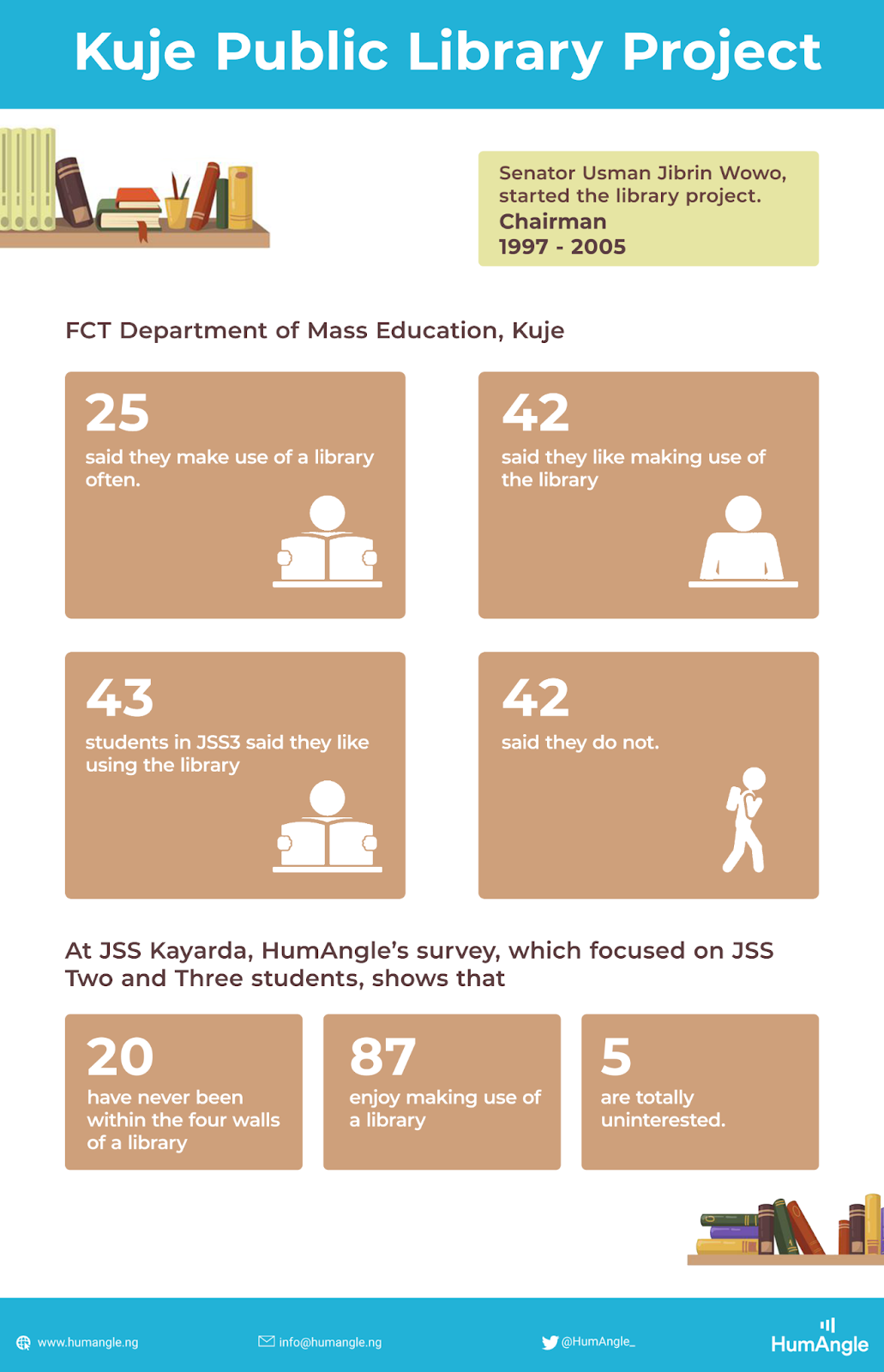
Aigbe added that Nigerians read when they have a well-equipped and comfortable library and technology is supposed to be an enabler. “There are different reading styles for different individuals. Not everybody would assimilate much from materials read from tablets or phones compared to physical books. Books are still effective in this technological age, and then of course, there is the ICT section of the library,” he explained.
A professor from the department of English, University of Abuja, Vickie Sylvester, believes Nigeria has grown with what she described as a colonial disposition. “[For] a lot of things we run in Nigeria, we follow what colonial education has started for us without looking at how they work,” she said.
Referring to the way Nigeria treats its educational sector, Prof. Sylvester gave an instance. “In Britain, you don’t see cracks on the road before they start working on it. Here, we wait for cracks or somebody to die before we do,” she said.
The professor pointed out that when the British came to Nigeria, the first thing they did was teach people how to read and write for labour purposes. Today children are taught to read and write for the purpose of communication but are not encouraged to read.
“When you start reading to a child, he or she grows with good communication, even at the age of three or four, because he listens to you and takes what is impacted,” she explained. “And because he starts reading picture books, he eventually graduates to reading words.”
Prof. Sylvester compared Nigeria to the United Kingdom where she said every community has a library and people who have never been to school train themselves to read and write.
“A typical example is Charles Dickens whose work we study today. He didn’t have a college education. His father went to prison and he had to work in a shoe factory as a child. After working, he goes to the library to learn to read and write. He started publishing a series in a newspaper where he was paid weekly. That was how his novel started,” she narrated to establish that libraries are important.
In response to the notion some hold that Nigerians, and particularly students, do not necessarily find libraries useful or necessary, the English professor pointed out that libraries are not available enough for such a conclusion to be drawn.
“A lot of children come straight from school to meet their parents in the market. If there is a library there, many of them would go there to do their homework and read books that are available,” she argued.
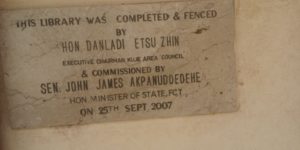
Schooling without libraries
Raphael Chidiebere and Chioma Ozo both had their basic education at JSS Kayarda, a school in Kuje without a library till date.
Chidiebere, who recently wrote his Unified Tertiary Matriculation Examination (UTME) and aims to study architecture, recalled how he never realised that he was missing out on anything.
Then one day, while he was in JSS 3, their father took them to Silverbird Galleria in Abuja and Chidebere was awestruck by the number of books in a bookstore. For someone who was used to reading books he got for N100 like Ali Goes To School and portable comic books, he was taken aback when he picked a small book and learned it was N12,000.
Back in JSS Kayarda, their principal had announced a plan to build a library and Chidiebere was among those who were hopeful. “But until we left, it wasn’t built,” he told HumAngle.
When Chidiebere used a library for the first time in GSS Kuje, apart from the fact that there were restrictions that forced students to read a library book only for an hour, he was disappointed by the types of books he saw. “They were mostly recommended texts like those written by Chinua Achebe that I had already read,” he complained.
Chidiebere, who likes to go beyond what he learns within the four walls of a classroom, pointed out that he found some history books, which talked about the earth and colonialism, interesting.
But, “all through my primary and junior secondary school days, I have not had a library experience and still feel I am yet to have the real experience,” he said.
Like Chidiebere, Chioma Ozo who desires to study law in the university went through school without enjoying the benefits of a library until she left JSS Kayarda.
“It would have provided me with a quiet place to study with little distraction,” she said.
Kuje council students yearn for libraries
To sample opinions on what a local public library and access to such space in general means to students, HumAngle took a survey in two public secondary schools in proximity to Kuje’s abandoned library.
About 200 metres away from the library is a government-owned school with a signpost that reads: Federal Capital Territory (FCT) Department of Mass Education, Kuje Zonal Office. Here, study opportunities offered include basic and post-basic literacy programmes, continuing education in the form of extramural lessons at the junior and senior secondary level, vocational training, as well as women and girl-child education.
The secondary school students at FCT Department of Mass Education are described as ‘second chance’ students because they are usually those who have had bad records, academically or otherwise, in their previous schools.
Out of 43 final-year students who filled the questionnaire asking if they use a library often or not, 25 answered yes to making use of a library often while 18 ticked the ‘not often’ box.
Also, in response to whether they like using a library, 42 responded in the positive with only one in the negative.
One of the students, Lotanna Nwachukwu, points out that her school library does not have all she needs and that a local public library would have given her the opportunity to do more research.
Her classmate, Mondol Tersai, has difficulty with oral English and believes an out-of-school space where he could have access to books on this topic will be valuable to him.
But Momoh Jennifer, on the other hand, has a craving for stories and whole novels and likes to go beyond prescribed texts unlike some of her classmates who read such books because it is required of them.
In the same school, 43 students in Junior Secondary Three (JSS3) say they like using the library while four do not.
Michael Tebe, for instance, prepares ahead of time in his small school library when his teachers give his class the scheme of work for the term. In Gudaba, where he lives, he has made a bookshop his study spot.
On the other hand, Tebe’s classmate, Olaleye Rokuba, has an interest in novellas. At her home in Pasali, within the area council, she treks to a private library she pays a token to use.
At JSS Kayarda, HumAngle’s survey, which focused on JSS Two and Three students, shows that 20 of them have never been within the four walls of a library, 87 enjoy making use of such a facility, and five are totally uninterested.
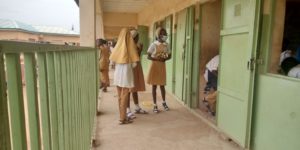
But JSS Kayarda, a school of two blocks of single-story buildings, does not have a library where students can study or conduct any type of research.
Like their counterparts at FCT Department of Mass Communication, some students of JSS Kayarda long for a quiet place to study and explore books they otherwise do not have access to.
HumAngle was able to get hold of a list of private schools under Kuje Area Council, which puts their number at 412. Among these, there are only 15 with adequate libraries according to the FCTA Education Secretariat Department of Quality Assurance.
Again, while 178 are registrable, 234 are substandard and unregistrable.
What influences the quality department’s verdict are physical facilities such as classrooms, administrative blocks, science laboratories, computer science laboratories, toilets, sports fields or playgrounds, the general environment, sanitation, and the availability of a library.
There are not less than 77 public schools under the Council, and out of these only nine have adequate libraries.
A source in the quality assurance office points out that some of the libraries among the nine are dilapidated. Also, although some appear to be well stocked with books, they are mainly obsolete. But what gives them the privilege of being classified under schools with adequate libraries is the fact that they have a wide space.
The difference shows in WASSCE performance
A record obtained by HumAngle of the performance of FCT secondary school students in the 2015 West African Senior School Certificate Examination (WASSCE) shows that out of 10,362 candidates, only 211 students (two per cent) got five credits and above, excluding English language and Mathematics.

Only 159 got five credits and above including English language, 4,750 with five credits and above including Mathematics, and 4,350 with five credits and above including Mathematics and English.
For private schools, out of 8,522 candidates in the same year, a hundred had five credits and above excluding English and Mathematics, 6,701 with five credits and above including English, 5,720 with five credits and above including Mathematics, and 5,470 with five credits and above including English and Mathematics.
In the June/July 2015 National Examination Council (NECO) test, out of 14,422 candidates, there were 13,516 with five credits and above, excluding English and Mathematics.
When will Kuje get public libraries?
In 2017, then executive chairman of the Council, Honourable Abdullahi Danladi Galadima explained that his government had made efforts to put the library to use. He also made a promise: “I want to assure the people of Kuje Area Council that, very soon, we will put the library in order. It would be better than it is.” He added that “students would have a place to study.”
But this promise was not fulfilled, a situation likely to negatively impact education in Kuje and set a bad example for schools, particularly those owned by the government, that lack such facilities or are left in a terrible state.
All attempts to get an official response from the current chairman, Abdullahi Suleiman Sabo, failed as of the time this report was filed.
——————————————————————————————————————————–
This story was produced in partnership with Civic Media Lab under its Grassroots News Project with support from the National Endowment for Democracy.
Support Our Journalism
There are millions of ordinary people affected by conflict in Africa whose stories are missing in the mainstream media. HumAngle is determined to tell those challenging and under-reported stories, hoping that the people impacted by these conflicts will find the safety and security they deserve.
To ensure that we continue to provide public service coverage, we have a small favour to ask you. We want you to be part of our journalistic endeavour by contributing a token to us.
Your donation will further promote a robust, free, and independent media.
Donate HereStay Closer To The Stories That Matter




